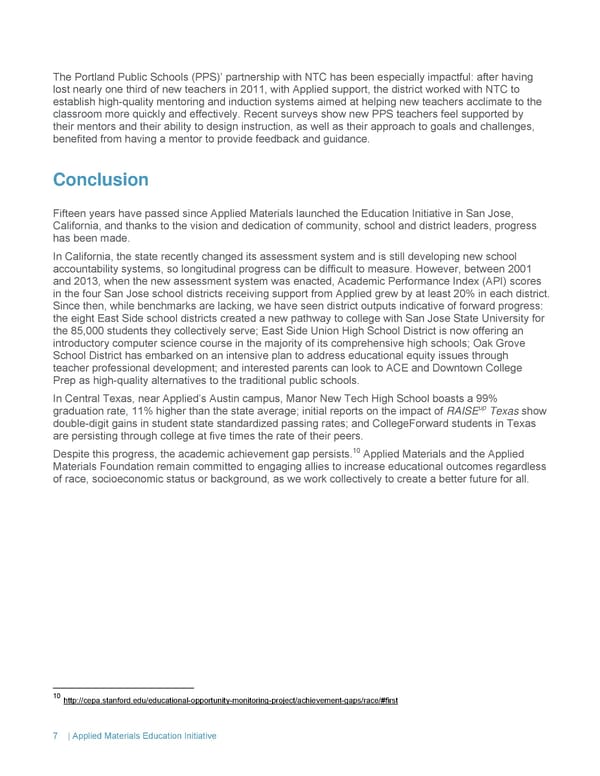The Portland Public Schools (PPS)’ partnership with NTC has been especially impactful: after having lost nearly one third of new teachers in 2011, with Applied support, the district worked with NTC to establish high-quality mentoring and induction systems aimed at helping new teachers acclimate to the classroom more quickly and effectively. Recent surveys show new PPS teachers feel supported by their mentors and their ability to design instruction, as well as their approach to goals and challenges, benefited from having a mentor to provide feedback and guidance. Conclusion Fifteen years have passed since Applied Materials launched the Education Initiative in San Jose, California, and thanks to the vision and dedication of community, school and district leaders, progress has been made. In California, the state recently changed its assessment system and is still developing new school accountability systems, so longitudinal progress can be difficult to measure. However, between 2001 and 2013, when the new assessment system was enacted, Academic Performance Index (API) scores in the four San Jose school districts receiving support from Applied grew by at least 20% in each district. Since then, while benchmarks are lacking, we have seen district outputs indicative of forward progress: the eight East Side school districts created a new pathway to college with San Jose State University for the 85,000 students they collectively serve; East Side Union High School District is now offering an introductory computer science course in the majority of its comprehensive high schools; Oak Grove School District has embarked on an intensive plan to address educational equity issues through teacher professional development; and interested parents can look to ACE and Downtown College Prep as high-quality alternatives to the traditional public schools. In Central Texas, near Applied’s Austin campus, Manor New Tech High School boasts a 99% graduation rate, 11% higher than the state average; initial reports on the impact of RAISEup Texas show double-digit gains in student state standardized passing rates; and CollegeForward students in Texas are persisting through college at five times the rate of their peers. 10 Despite this progress, the academic achievement gap persists. Applied Materials and the Applied Materials Foundation remain committed to engaging allies to increase educational outcomes regardless of race, socioeconomic status or background, as we work collectively to create a better future for all. 10 http://cepa.stanford.edu/educational-opportunity-monitoring-project/achievement-gaps/race/#first 7 | Applied Materials Education Initiative
 Applied Materials Education Initiative Page 6 Page 8
Applied Materials Education Initiative Page 6 Page 8